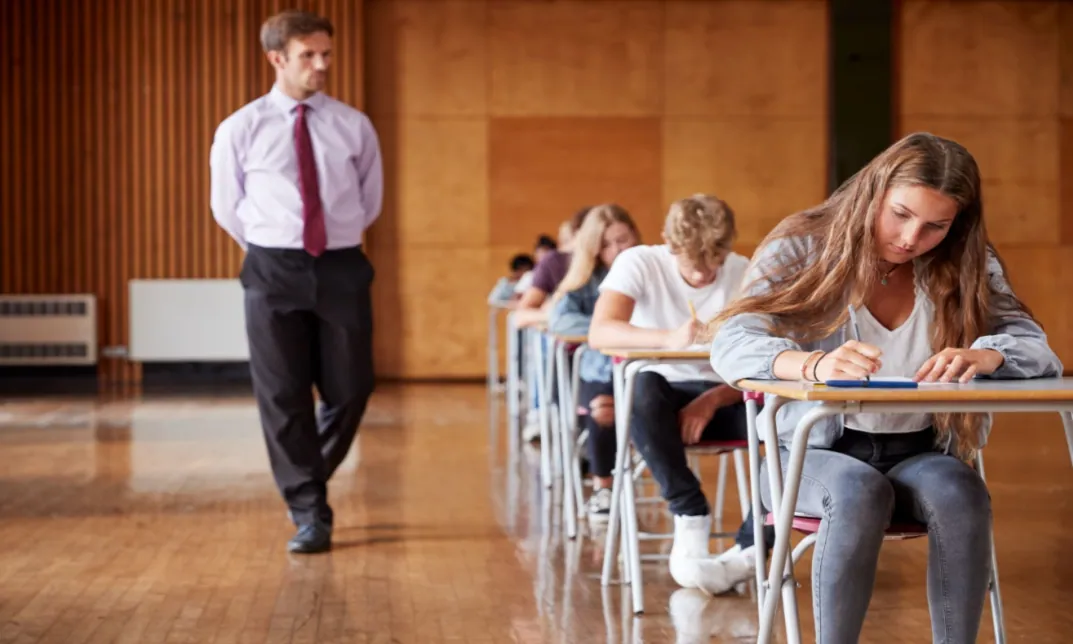Exams can be stressful for students, with pressure building in every hall. But behind every successful session, there is always an exam invigilator. So, what does an exam invigilator do?
An exam invigilator makes sure exams are fair, quiet, and run according to the rules. In fact, schools often hire invigilators on a casual or seasonal basis, especially during the busy GCSE and A-level period (May–June). At this time, multiple invigilators are needed in each hall to meet exam board requirements. Overall, the job combines administration, supervision, and safeguarding. Every step they take helps the exam run smoothly and gives every student a fair chance to succeed.
If you’re curious about the full scope of their role, let’s explore what an exam invigilator does.
What Is the Role of an Exam Invigilator?
An exam invigilator makes sure every exam runs in a fair and organised way. They start and finish the exam on time and ensure all students have the same conditions. More importantly, they follow the school and exam board rules, usually from JCQ, and never allow extra help or unauthorised materials.
During the exam, they stay alert and watchful at all times. When issues come up, like late arrivals, illness, or possible cheating, they handle them calmly and quickly. In the end, their main goal is simple: to keep the room peaceful and focused so every student gets a fair chance to do their best.
What Does an Exam Invigilator Do Before Exams Start?
Before an exam begins, an invigilator completes several important tasks to ensure everything runs smoothly:
- Set up the exam room: Arrange the desks correctly, make sure there is enough space, check that a clock can be seen, and remove anything that is not allowed.
- Check papers and special plans: Make sure the exam papers, attendance lists, and any special needs are ready. This helps to avoid problems later.
- Welcome students: Greet each student, help them find their seats, and check their ID carefully.
- Give clear instructions: Hand out the exam papers, explain the rules, and tell students the start and end times.
- Collect banned items: Take away anything that is not allowed, such as mobile phones, notes, or other materials.
What Are the Main Duties During an Exam?
During the exam, an invigilator plays a key role in keeping everything fair, calm, and organised. Their main duties include:
- Start and end on time: Begin the exam promptly and note the start and finish times clearly.
- Supervise students: Watch the whole room carefully to prevent cheating or rule-breaking.
- Monitor behaviour: Ensure students do not communicate or use unauthorised materials.
- Handle student needs: Provide toilet breaks, extra paper, or help unwell students quietly.
- Manage departures: Escort students leaving temporarily and keep them under supervision.
- Report problems: Immediately inform the exams officer about any cheating or unusual incidents.
- Maintain order: Keep the room quiet and give regular time updates to help students focus.
What Does an Exam Invigilator Do After the Exam Ends?
After the exam, an invigilator does a few important things to keep everything safe and tidy:
- Stop the exam and collect papers: Tell students to put down their pens and collect all papers carefully.
- Check candidate numbers: Make sure each paper matches the student list so nothing is missing.
- Return papers securely: Give the exam papers to the exam officer or put them in a safe place.
- Tidy the room: Arrange desks and clear materials for the next session.

What Skills Do You Need to Be an Exam Invigilator?
An invigilator needs a mix of people skills and practical sense. Each one makes it easier to manage the room and support candidates.
- Good communication: Speak clearly and confidently so every student understands your instructions.
- Strong attention to detail: Notice every small thing, from missing papers to extra materials.
- Calm and firm attitude: Stay relaxed but handle problems quickly and fairly when they happen.
- Great time management: Keep track of every minute so the exam starts and ends right on time.
These seem like simple and basic skills. Yet, they can turn a stressful exam into a well-organised and calm session. If you want to become an exam invigilator or learn the steps to start this role, read our article: “How Do I Become An Exam Invigilator”.
Do You Need Qualifications or Training for This Role?
Most schools do not need special qualifications to be an exam invigilator. You need to be reliable, careful, and follow instructions. Schools give training to show you how to set up the room, give papers, watch students, solve problems, and report anything unusual. You must pass safeguarding and DBS checks to work safely with students.
Experience can help, but it is not needed. With the right attitude, almost anyone can do this job. It is more about being alert and trustworthy than having special qualifications.
How Much Do Exam Invigilators Get Paid?
In the UK, casual exam invigilators usually earn £12 to £14.50 per hour. Pay can be higher in London, for senior roles, or for extra duties.
You are paid per exam session. Morning sessions are 8:30 am to 11:00 am. Afternoon sessions are 12:30 pm to 3:30 pm. Doing more sessions during busy times can increase your earnings. The job is seasonal but flexible. It is a good way to earn extra money, gain school experience, and fit around other commitments.
Is Being an Exam Invigilator a Good Job?
Yes, being an exam invigilator is a good job if you want flexible, term-time work. The role is simple and low-prep, so you can focus on keeping exams calm and fair.
In addition, it helps you gain valuable school experience and improve skills like supervision, organisation, and communication. Many people use it as a stepping stone to teaching assistant or administrative roles.
However, it isn’t suitable if you need full-time, year-round work, because the role is seasonal and session-based.

Challenges Exam Invigilators Can Face
Here are some common situations exam invigilators may need to handle:
- Nervous students: Some students may feel worried, talk, or move. Stay calm and keep the room quiet.
- Missing or extra materials: Sometimes papers or materials are missing or extra. Handle them carefully and stay calm.
- Technical problems: Clocks, projectors, or other equipment might stop working. Fix problems quickly so the exam continues.
- Late students: Some students may come late. Let them in quietly without disturbing others.
- Unwell students: A student may feel sick. Help them quietly and keep the room calm.
Final Thoughts: Understanding the Exam Invigilator Role
Exam invigilators help make exams run smoothly. They set up the room, watch over students, and finish the exam, making sure everyone has a fair chance. The job is flexible. Hours are short and seasonal. Pay is fair. Training is given, so you just need to be reliable, careful, and follow the rules. It is a simple job, but it is rewarding and gives you useful school experience.
Passionate about becoming an exam invigilator and want to start your training today? Enrol in the Invigilator Training at the School of Health Care and gain the skills that you need to succeed.
FAQs
What skills do you need to be an exam invigilator?
Clear communication, attention to detail, calm but firm behaviour, and good timekeeping.
What are the responsibilities of an exam invigilator?
Set up the exam, supervise students, follow rules, handle issues, and collect papers afterwards.
Is it worth being an exam invigilator?
Yes, for flexible, term-time work, gaining school experience, and earning extra money.
What questions will I be asked at an exam invigilator interview?
Expect questions on handling disruptions, following rules, supervising students, and dealing with emergencies.
What should an invigilator not do during the exam?
Do not help students, allow unauthorised materials, or ignore cheating or rule breaches.
What are the three C’s of interview questions?
Competence, character, and communication.
What are the three golden rules of an interview?
Be prepared, be confident, and be honest.




